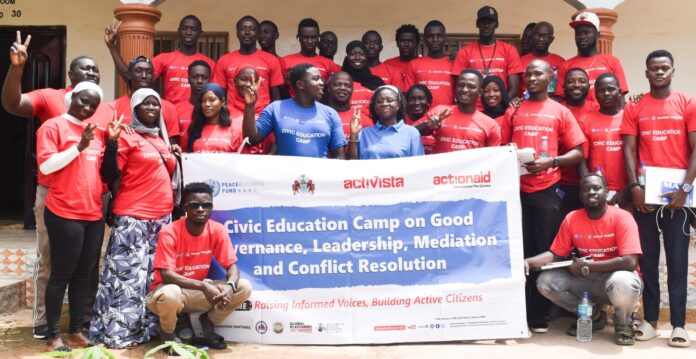Written by: Alieu Jallow
Civic education is proving to be a powerful tool in transforming communities and strengthening democratic resilience in The Gambia. This was evident in Jarra Soma, Lower River Region (LRR), where Activista The Gambia, in partnership with the Ministry of Youth and Sports, Safe Home for Migrants Association, and Global Platform, organised a training camp funded by the UNFPA Youth Promotion Initiative (YPI) and proudly led by ActionAid International The Gambia.
The camp was designed to deepen youth understanding of governance, human rights, and democratic participation, while also equipping them with skills in mediation, dialogue, and nonviolent communication. Its ultimate goal was to empower youth leaders to become peace ambassadors in their respective communities.
Mamu Trawally, a civic teacher, underscored the importance of the training. He explained that the skills acquired were relevant not only to his community but also within academic settings.
“It equips me with the ability to manage and resolve conflicts in a fair and constructive manner, ensuring that disagreements do not escalate into hostility. By applying nonviolent communication, I can express ideas respectfully and encourage dialogue that promotes mutual understanding. These approaches will reduce tensions, strengthen relationships among peers and community members, and foster a culture of peaceful coexistence where challenges are addressed through dialogue rather than confrontation,” he said.
Trawally further reflected on the challenges youth face in promoting good governance.
“A key challenge is limited access to civic education, which often leaves many unaware of their rights, responsibilities, and the channels available for participation. Additionally, structural barriers such as the underrepresentation of youth in decision-making spaces and the lack of trust from older generations hinder their contributions.
“Socioeconomic challenges including unemployment, poverty, and resource constraints further discourage active engagement. To address these challenges, youth networks must collaborate by creating platforms for peer learning, advocacy, and joint action. By organising awareness campaigns, building leadership capacities, and engaging constructively with policymakers, youth networks can amplify their voices and present unified positions on governance issues.”
Highlighting the unique role of young leaders, he added: “Youth leaders can model accountability by promoting inclusive participation, ensuring that marginalised voices are heard, and advocating for policies that reflect the genuine needs of the people. In doing so, they not only bridge gaps but also contribute to a culture of peace, mutual respect, and responsible governance.”
FaBakary Sanneh, a youth coordinator in LRR, lamented the persistent challenges young people face in The Gambia’s democratic space.
“The right to access information at the right time and freedom of expression and assembly to exercise their democratisation in practice remain hurdles. The youth network should be well organised and coordinated to defend the country’s peace as well as the adherence to the rule of law, increase civic awareness and participation in our democratic dispensation, and promote the peace and stability The Gambia is well known for,” he outlined.
For Ansumana Camara, National Coordinator of Activista The Gambia, the training camp is a cornerstone of civic renewal.
“The civic camp is launched to strengthen youth understanding of governance, human rights, and democratic participation, and to build their skills in mediation, dialogue, and nonviolent communication. Empowering youth leaders to serve as peace ambassadors in their communities is a fundamental principle of building a peaceful and progressive society,” he stated.
He also emphasised the programme’s impact in schools: “Strengthening youth networks and collaborative leadership focusing on good governance, conflict resolution, and mediation is a powerful step toward embedding civic values in our classrooms and communities. We’re especially excited to welcome 10 civic education teachers representing 10 senior secondary schools across the Lower River Region (LRR) to be trained on principles of good governance, human rights, and democracy. Interactive dialogues on the rights of migrant returnees and strategies for reintegration and inclusion were also part of the camp.”
The camp brought together youth leaders from regional and district youth committees, civic education teachers, and migrant returnee advocates. United by a shared commitment to peace and progress, participants left with renewed purpose to bridge divides, defend democratic values, and strengthen civic awareness across The Gambia.




